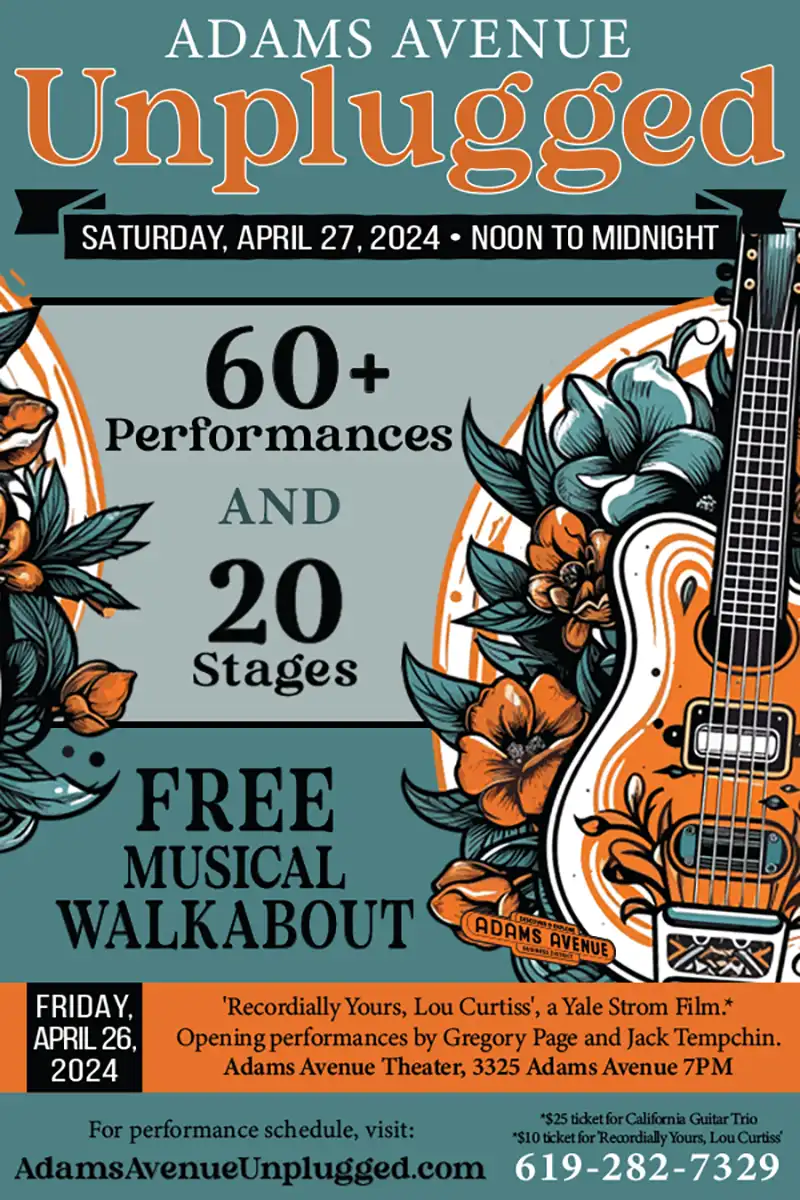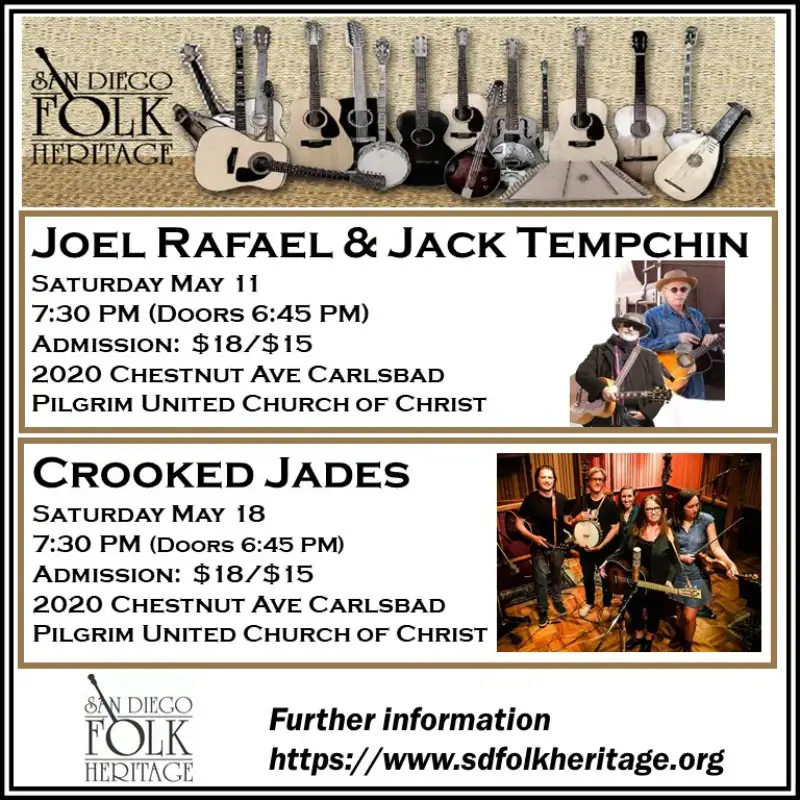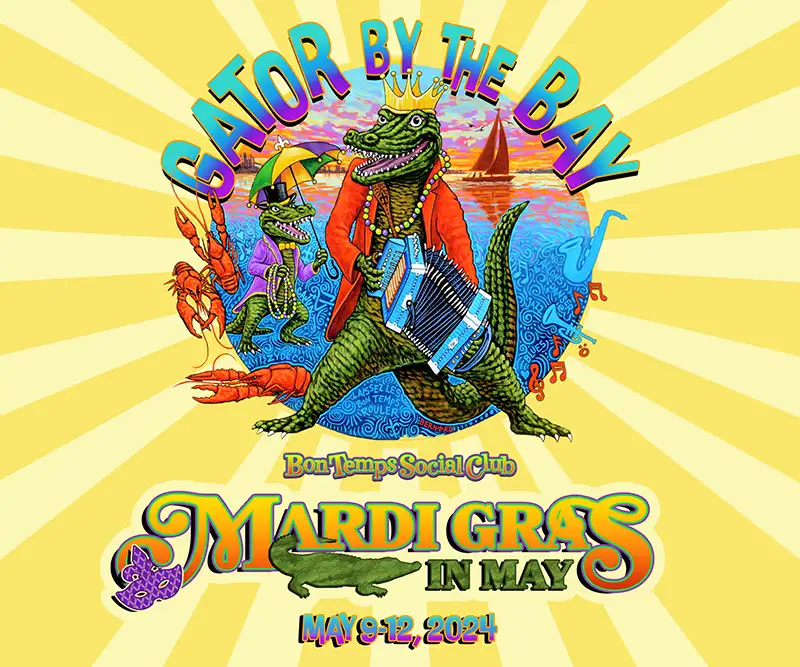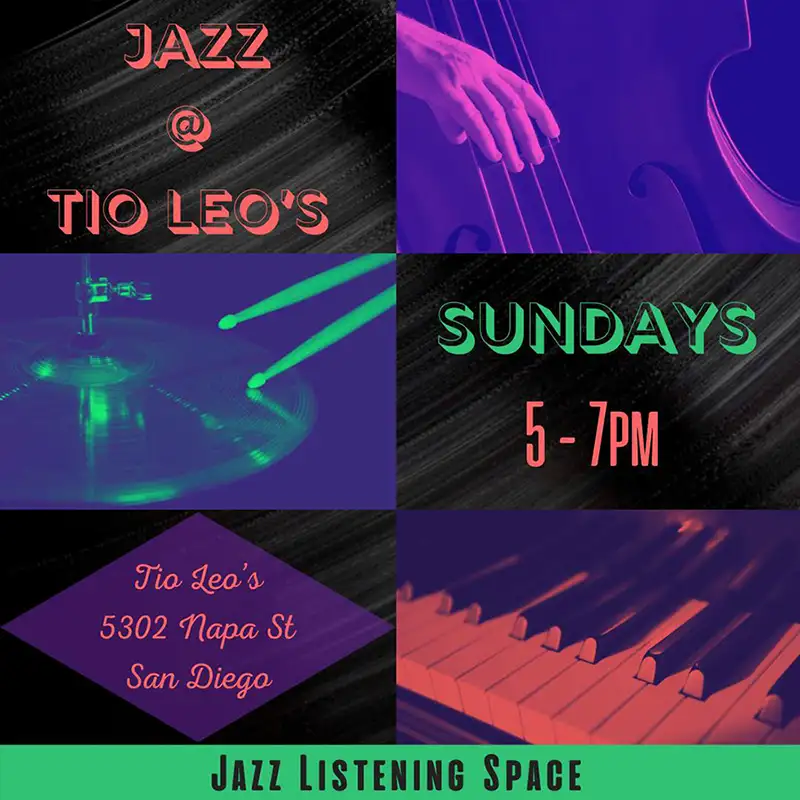Cover Story
John Mailander: The Knack and How He Got It
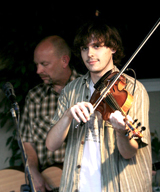
John Mailander. Photograph by Dennis Andersen
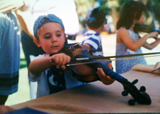
Mailander at age 4, 6 years before he started lessons.
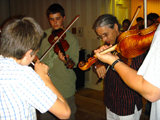
At Mark O’Connor’s Fiddle Camp, 2005, with Darol Anger
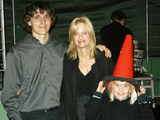
After the 2010 Summer Pops, with Allison Brown
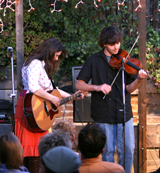
With Sara Petite at Adobe Falls House Concerts last year. Photograph by Dennis Andersen
John Mailander is a fiddler with a fantastic future ahead of him. The young musician, who has just completed his second year at the prestigious Berklee College of Music, is already making a name for himself in local circles, having played with area musical mainstays like Chris Clarke, Robin Henkel, and the 7th Day Buskers. He is also a member of Sara Petite’s band the Sugar Daddies. Although his career is just getting underway, he has already performed at the Belly Up and the Hollywood House of Blues as well as a series of Summer Pops concerts, accompanying many of his favorite musicians. His studio experience includes recording an album with Plow, an alt-country band he co-founded with Chris Clarke. When asked about his continued participation with the project, he has to admit that “it’s not so much for me anymore. Chris reformed Plow after I left for school. The new line up sounds great! I always enjoy reuniting musically with those guys whenever I’m in town. I also play on [Clarke’s] new record that’s coming out soon.” In addition to that, he has upcoming CD releases with the iconic local acoustic duo Berkley Hart as well as homegrown rockers The Heavy Guilt, with more work sure to follow. Already speaking like a consummate professional, he expresses great enthusiasm for all of these projects. “I can’t wait to hear Berkley Hart’s new record. I felt really good about that. I just recorded with this local band called The Heavy Guilt. They’re a really great rock ‘n’ roll band and I played some string parts on their new record. They’re great! That was a fun session to do.”
Although he is still a student, Mailander makes sure to take full advantage of any opportunities to find work on stage and in the studio. For now, he is happy to get local live, session, and teaching gigs during his summer break. Speaking softly and with a thoughtfully measured cadence, he considers his future when he says, “I’m hoping to get some work as a session musician after school. With every semester in Boston, it seems that more opportunities come up. The more people I meet and start playing with…I’m starting to establish myself out there.” Because he still has a couple more years to complete his studies at Berklee, he is more than content to concentrate on the present. “I’ve thought about [being based in] San Diego and considered Nashville or staying in Boston. Right now I’m trying to soak it all up while I’m there and hopefully the opportunities will present themselves. That’s how it seems to be happening so far.”
Located in Boston, the Berklee College of Music is a famed institution dedicated to providing a practical education with the sole purpose of preparing students for careers as working musicians. Its website clearly states that the school was “founded on the revolutionary principle that the best way to prepare students for careers in music is through the study and practice of contemporary music.” Many of today’s best players have attended the school and, even more interesting, many high profile performers are often tapped to share their expertise and experience with the student body. Mailander remarks that “Berklee actually has a really great acoustic music scene right now. You can minor in American Roots Music. It’s a new program. I’m majoring in violin performance with an emphasis on American Roots Music. They’re bringing in a lot of guest artists that come from a bluegrass background. Bela Fleck was just there.” He is visibly quite pleased when he reveals that Darol Anger is his private instructor at Berklee (Anger is a noted classical, folk, and jazz violinist known for his work with the David Grisman Quintet, the Turtle Island Quartet, and the Republic of Strings). “I love his playing. He’s one of my heroes.” As further proof of the quality education he is receiving, he recalls, “Last semester I had the opportunity to play with Victor Wooten (legendary bassist for Bela Fleck and the Flecktones). I’d been listening to his music a lot and was so inspired by that experience. As part of a student ensemble we had to work out a lot of his music. He was at Berklee for a week and we played these tunes for him and he gave us some of his feedback. At the actual show at the end of the week, he came up and played with us. Stuart Duncan [a noted bluegrass multi-instrumentalist whom Mailander admires] plays on some of his records so I played those fiddle parts.”
It’s interesting to hear him describe his experience at school. As he describes it, it is evidently as big a departure from a classical conservatory as one can imagine. Although musical theory and instrumental technique are the foundation of the instruction, there are so many other things going on that serve to enrich each student’s educational experience. In response to a query, he says, “Certain professors do [emphasize classical technique]. They have a lab where you can go in and play prepared pieces. It’s like a master class. That can be pretty strict with technique and stuff, but what they teach at Berklee is more theoretical and less about actual technique. A lot of what I learned about actual playing comes from just playing with people outside of class — getting together with friends outside of school. The theoretical stuff they teach at Berklee really helps to supplement the actual playing, but I think it’s all about how each individual person spends their time there. It can be strict, but that’s only half the experience. The other half of the learning process is what you do in your own time outside of class, just getting together with your classmates and jamming and teaching tunes to each other. That’s where you really get to use what they teach you in class. It’s a really organic thing. Networking is a huge part of the educational experience…just getting together and playing with people. My classmates have just as much to teach as the professors do, which is really cool.” Although he was already a proficient player going in, Mailander feels that he is getting a valuable education at this school. “I feel like [Berklee] has completely changed the way I think about music. It’s hard for me to tell how my playing has changed because I play every day and I hear myself play every day, but I definitely process music differently when I listen to it. I’m able to appreciate a lot more music that I may not have understood before. ”
Although he began playing violin in the elementary school orchestra at ten years of age, he has his parents, Monica Howard and Tad Mailander, to thank for exposing him to music early on. Although they are not musicians themselves, he proudly declares, “They’re huge music fans. They’re great listeners and they’ve been bringing me to festivals since I was a kid; since before I even started playing and I’m really grateful for that. To have that exposure to live music for so long before I actually decided to start playing. My parents have been extremely supportive.” He first developed a taste for traditional and contemporary fiddle music at the Strawberry Music Festival, a gathering of acoustic artists and fans that takes place twice a year at Camp Mather near Yosemite. “I got my start in bluegrass, for sure. San Diego has an awesome roots music scene and bluegrass scene. So I think the reason that I really started with that stuff is just because of the great community here around that kind of music. Everyone in the San Diego Bluegrass Society was extremely supportive of me from the beginning. There are just so many opportunities to get out and jam with people. So I really learned a lot about playing the fiddle just by going to jams around San Diego and they just happened to be bluegrass jams. The biggest reason I love that music so much is because of the people who play it and the community. I’ve always been interested in a lot of other kinds of music as well but bluegrass definitely has such a great community to grow up in. That’s how I really got started playing out.” Not surprisingly, his inquisitive mind has always led him to explore many other different musical styles. “My musical tastes are pretty much all over the place. Lately? I really love the Derek Trucks Band. I just saw the Derek Trucks and Susan Tedeschi a couple weeks ago. They have an amazing band! I like Stuart Duncan a lot. I just saw him at the Strawberry Music Festival last week playing with the Tim O’Brien Band. Tim O’Brien’s definitely up there too. I love his stuff. They’re a bluegrass band. Tim O’Brien’s a songwriter so they do a lot of originals as well as traditional stuff.” Mailander has a deceptively simple requirement for the music that moves him: “Anything with soul.” He readily admits that “in high school I was listening to lots of classic rock and progressive rock.”
Of equal significance to his musical destiny was the annual Strings Conference hosted by Grammy-winning violinist and composer Mark O’Connor. Held at Point Loma Nazarene College, Mailander was a regular attendee until the event moved out of San Diego. He is quite sincere when he points out the impact it had upon him. “The Strings Conference was amazing. I had really just started when I went to that for the first time. It’s not in San Diego anymore, but [when it was] I went to it every year. It was all these amazing teachers of all different styles of fiddle music and it was a week of really intense classes. At night there were jams and stuff like that. I think it was the second or third fiddle camp I went to where I made the decision to pursue a career doing music.” It appears that this choice was a wise one, as he is pursuing it with the passion and purpose of one who has found his true calling in life.
For audience members, the life of a musician must appear to be filled with excitement and glamor. Those who take the stage sweep into town from far-off locales and take up residence in the eye of a whirlwind of attention and fun before heading out for parts unknown, ready to do it all over again. They get to do the thing they love, be acknowledged in a very public manner, and get paid for it! Regardless of the musical genre, performers are generally regarded as larger than life, possessed of talents that are beyond the abilities of the average person. Of course it’s true that, with some effort, just about anybody can achieve some degree of skill on an instrument. Yet those who can get up on a stage or record a piece of music for posterity are seen to be gifted with an extra measure of talent. That, coupled with the confidence to offer it up for scrutiny by the very discerning and often unforgiving public eye, is undoubtedly the heart of our love affair with musical artists. When it works, the rewards for both the performer and the audience are immense. The synergy between the music lover and the artist creates an alchemical reaction that can generate feelings across the entire spectrum of human emotions. When looked at from a purely artistic standpoint, the results can be intoxicating. The material rewards speak for themselves. The most successful performers are very conspicuously compensated for their talents, with record sales and box office takes skyrocketing to jaw-dropping heights. Nothing is too good for them, and very little is beyond their reach. And they get a free pass when it comes to the all-too-frequent incidences of irresponsible public behavior. Yet John Mailander is refreshingly level-headed about all of these things. For him, the motivations flow from a much purer source. “I love to perform. I definitely prefer the stage just because of the spontaneity of what can happen musically. It’s worth it working through all of the hard performances, just for those moments when everything lines up just right and you’re in front of a really attentive audience, and everybody onstage is listening to each other really well. Those are just amazing moments of music.” So despite the music industry’s well-deserved reputation for being a tough gig, it appears that Mailander is entering into it for exactly the right reasons. He very reasonably says, “I love playing music and I love the community [of players] and I can’t imagine doing anything else for a living. If I can make enough to get by playing music, I’ll be happy.”
As can be seen, Mailander’s experience encompasses a wide range of professional musical activity. Already a seasoned performer on both the concert stage and inside the recording studio, his credentials are enviable and will doubtlessly become more impressive with the passage of time. While he has expressed a preference for live work, he appreciates the value of creating music in a studio setting. “I really like recording in the studio, too. It’s nice to play a track multiple times and put down different ideas and go into the other room to listen back to what you did. That’s a really good educational experience — to listen to yourself. In all my session experience so far, it’s been going in and playing what I hear and what I feel with the music. Sometimes that’s not always what they want so they’ll let me know what they want me to change about it. I don’t always know what will actually be used on the final record.” While in town, he has even taken on a number of pupils who wish to benefit from the expertise and experience he has gained in his studies. “I’ve had a few private students here in San Diego.” However, since his time in town is limited to school breaks, he reluctantly allows that “usually they move on.” When asked if he enjoys taking on the role of a music teacher, he replies, “Yeah, I really do. It helps me to understand what I’m teaching more thoroughly, I think. I discover more about the concepts when I try to explain them. By doing that, I learn more about them myself.” He humbly continues, “I’m always a student, but yeah. It’s hard in Boston because there’s such a high concentration of musicians there. Out there everybody’s learning from each other and it’s just a really collaborative thing.” With an impressive amount of insight, he offers, “I don’t think you can ever completely be ‘there’ [as a musician]. The learning process never stops. I don’t think you can ever know everything there is to know about music. There are new things to learn every time you sit down and play with somebody.”
The one area he has yet to explore in great depth is that of writing his own original music, although he is open to the possibility of doing so someday. He nods thoughtfully, saying, “That’s a goal.” But as far as a solo project goes, “it’s kind of hard for me to know at this point. I see myself working with a band [rather] than being a front man. I just really like the collaboration that happens between different musicians rather than having my own vision and telling other people what I hear them playing. I’d rather have their ideas and have everything kind of work together. But writing original music is definitely something I’m interested in and just haven’t really touched on yet.” As if the demanding curriculum of Berklee weren’t enough, he is always on the lookout for ways to challenge himself musically. “I’m constantly trying to put myself in situations where I’m playing with musicians at a higher level than me. Especially in Boston, I’ll try to have one-on-one playing time with other musicians that I really respect. I think we have to really challenge ourselves in order to grow as musicians. I’m working on a lot of transcriptions. I’m really not working on pieces of music, but I’m trying to transcribe a lot of solos. It improves my listening more than anything. Just to listen to a passage over and over until I’m able to play it. It also helps me to get into the head of the musician I’m transcribing — to see how they think about their solo and see how it’s different to what I might have done if I was improvising a solo. It’s really challenging but it’s one of the most rewarding ways to practice that I do.”
Mailander makes no secret of his great desire to be a team player. “Eventually, I’d like to be playing with a full-time group and actually promoting that through touring and stuff like that. I’d like to be working in a band where we can all create music as a group.” Yet until that group comes along, he has proven himself to be an invaluable asset to the various artists with whom he collaborates. He brings his technical and theoretical expertise as well as his innate talent to every live gig and studio session. “Since going to Berklee, I’ve really been learning a lot about jazz harmonies. It’s a completely different world. I really love jazz music, but I haven’t yet had any opportunities to do jazz sessions in San Diego. But I’ve been playing with Robin Henkel a lot lately. We actually have a gig coming up at Wynola Red Barn in Julian next month on the tenth. We’re working on a lot of jazz and swing and funk. I’ve sat in with his band a few times and we’re working on some new stuff as a duo for this gig. Hopefully we’ll be doing more. I love stretching out in all kinds of musical directions.”
Henkel, always the seasoned professional, is generous in his praise of his young collaborator. “John is easy going and willing to play about anything. Some of the tunes he has brought to our rehearsals are challenging to me, but working on challenging material in the company of other musicians who sound good and are fun to work with make it a fun and beneficial learning experience. He brought a tune to the table called ‘Dysentery Stomp,’ which is kind of a swingy fiddling piece-a-fun challenge to play some nice rhythmic harmony on. John rises to the opportunity and is willing to face musical situations that are new to him. At two dates in particular [at Humphrey’s and Lestat’s] I asked him to play along with the saxophones in our horn section. Instead of three horns, our section was tenor and bari sax with John’s violin either on top or in the middle. John read the B flat horn parts, transposing as he went. It sounded great. We have a duo gig at Wynola coming up in July, so we’ve been playing once a week to experiment with repertoire. It’s not bluegrass and it’s not blues. We’re creating something that is our own from allowing our styles to merge and gel. It’s rootsy, American backwoods, sometimes swinging stuff.”
Chris Clarke recounts his first meeting with Mailander with fondness. “I first met John through Les Preston, a mutual friend, and we were all about to play a set as a pickup band one night. I distinctly remember meeting John, as Les was attempting to teach him the melody to the fiddle tune ‘Squirrel Hunters.’ I remember this because Les was thoroughly walking through the melody and John had it down after really only hearing it once….he didn’t need instruction. That night, I heard notes come from John’s fiddle that no one else was playing — dissonant, haunting notes, and fiddle playing as good as you’ll ever hear.” He goes even further to praise Mailander’s musical abilities by stating, “John’s playing, though largely influenced by traditional music that follows somewhat strict melody lines, is fresh and full of tasty improvisation. John’s note selection is right on the money. I’m fortunate to play with John. We started playing together about once a month in 2007, formed the original Plow, an old-time and bluegrass band, and have done some recording together. I just finished a solo record and John contributed to five of the songs, one of those we’ve been playing together since 2007 and finally got around to recording it. John brings a lot to the table — fiddle, mandolin, and he can even sing. Ask him to sing ‘Blue and Lonesome’ sometime….he kills it.”
Another high-profile artist whom he accompanies is none other than local sweetheart Sara Petite. Whenever he comes to town, he automatically becomes a Sugar Daddy and adds his magic to her live show. “I love playing with Sara. She gives a lot of freedom as far as adding my own interpretations to her music. She’ll give a lot of room for soloing and stuff. It’s always just a lot of fun to play music with her. Whenever I’m back in San Diego I’ll pretty much join her for all the local shows. I have a great time playing with her, especially when Steve Peavey’s in town. He plays with Sara a lot but he lives in Nashville so he’s not always here. He’s a multi-instrumentalist. A lot of times he’ll play mandolin with Sara. Whenever we’re playing a show together, we just always have a really great connection on stage and there are always some amazing, spontaneous musical moments that happen.” As if all of this weren’t enough to keep Mailander busy during his so-called “school break,” he has put his networking experience to further good use. “I also play with a bluegrass band called the Taildraggers when I’m in town. They’re a lot of fun to play with too. They’re more of a traditional bluegrass band.” Yet incredibly, he still declares, “I haven’t been as busy playing out so far this summer as I usually am. I have stuff lined up for August, which I’m looking forward to.”
Although most musicians can tell nightmarish road stories that are only funny in hindsight, Mailander’s career as a live performer has been blessed with good luck up to this point. He says with a smile, “It’s only been good experiences so far.” He pauses as if to make sure, then nods. “I can only think of good experiences!” Perhaps his most memorable performance to date was with one of his favorite artists at a very prestigious venue. “Last summer I played with the Alison Brown quartet. That was with Summer Pops. She’s a Grammy-winning banjo player and she has a jazz quartet. A mutual friend recommended me to play with them and that was one of the most amazing musical experiences I’ve ever had. I just met them the night before the show at the sound check and they were sending me tunes overnight. I got up really early the next day and learned the songs, went to the show, and ended up playing all three nights with them. I’ve always been a huge fan of her music so that was a very memorable experience. She has a really amazing band too. Banjo, electric bass, drums, and piano. And then I played fiddle. That was great!”
Aside from returning to school, what is in John Mailander’s immediate future? “Right now I have some down time from performing, but I’m still trying to stay really busy with things that’ll be productive. I’m working on a website right now [see www.johnmailander.com for show information]. I’m practicing a lot and will be playing some shows with Sara in August and playing at Wynola with Robin. I’ll probably have a few shows with the Taildraggers as well.” He adds that he sometimes plays with Joe Pomianek, the guitar player from the current lineup of Plow. The two of them will be performing as a duo at Wynola Pizza on Saturday, July 2. He will also conduct two workshops at New Expression Music on August 6. One will be a beginning fiddle workshop, and the other will be geared toward more advanced players interested in music theory and improvising.
As if further proof of his connection to the music community is needed, Mailander asks if he might say a few words to remember a couple of recently departed musicians with whom he has played. “Did you know Johnny Kuhlken [Sara Petite’s drummer]? And also Tanya Rose (iconic local folk singer)? They both passed away. They were extremely supportive to me. They were both such huge influences. Tanya and Johnny…I’m really lucky to have had the opportunity to play with both of them. It’s just such a huge loss. Every show I did with Sara, Johnny was playing drums. We shared so many great musical experiences together.” Such thoughtfulness speaks volumes about an artist whose prodigious abilities might tempt him toward avarice and egocentrism. In his chosen field, those are qualities that are commonplace and sometimes even expected. Yet he demonstrates a sense of humility and gratitude that reveals how much he values and respects all who have contributed to the ongoing legacy of live and recorded music. If there are more out there like him, the future of music is in very good hands.
Mailander will be at Wynola Pizza on July 2 and July 10 as well as teaching a workshop at New Expression Music this month.


